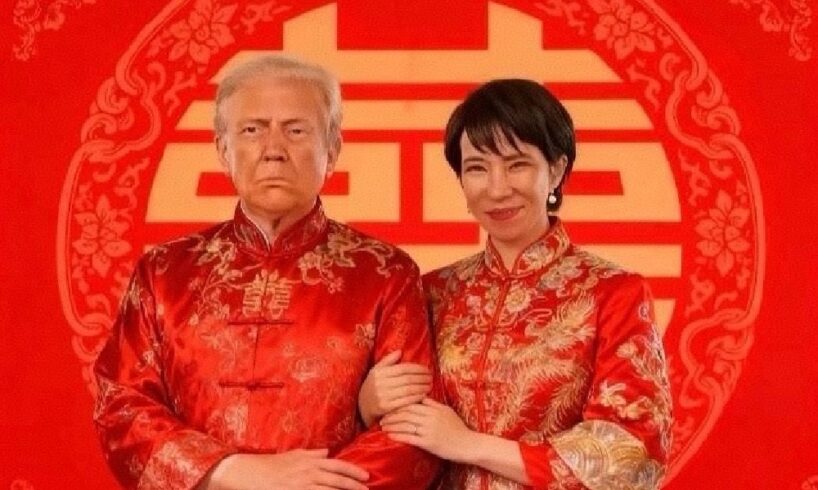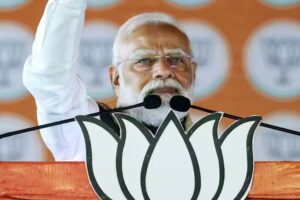
It was a pleasant autumn day in Tokyo on October 28, when Trump first met Japan’s newly-elected Prime Minister Sanae Takaichi (高市早苗).
Takaichi welcomed Trump at the State Guest House as her first foreign guest since taking office as Japan’s first-ever female leader, offering what Yomiuri Shimbun described as “Takaichi-style hospitality.”
During the visit, Trump and Takaichi held a bilateral summit during which Takaichi expressed desire to build a new “golden age” for the US-Japan alliance. Afterwards, they signed agreements and exchanged gifts — a golf bag for Trump, signed by Japanese golf star Hideki Matsuyama (with whom Trump has previously played), and “Japan is Back” baseball caps for Takaichi.
Following a lunch that featured Japanese vegetables and American steak, the two visited the US Navy’s Yokosuka base, where Trump remarked that he and Takaichi had “become very close friends all of a sudden.”
On Chinese social media, the meeting drew considerable attention.
There has been heightened focus in China on Sanae Takaichi beyond anti-Japanese sentiment and her recent appointment as Japan’s first female Prime Minister — as she is widely regarded as a far-right politician who denies, downplays, or glorifies historical facts related to the Second Sino-Japanese War (1931-1945).
Japan’s official narrative of its wartime past has long been a major obstacle to deeper reconciliation between China and Japan, and it is highly unlikely that Takaichi’s views of the war are going to bring China and Japan any closer. Among others, she is known for visiting Yasukuni Shrine, the Tokyo shrine that honors Japan’s war dead (including those who committed war crimes in China). She also claimed that Japan’s aggression following the Manchurian Incident, which led to the outbreak of the Second Sino-Japanese War, was an act of “self-defense.”
In light of these tensions in Sino-Japanese relations, and because of the changing dynamics in the current US-China relationship, many details surrounding the Trump–Takaichi meeting became popular talking points.
🔴 Trump: Reaffirming US Dominance, Insensitive to Japan’s Wartime Past
Many netizens focused on moments they interpreted as Trump asserting dominance or showing disregard for Japan.
👉 One awkward moment showed how, during the welcoming ceremony, Takaichi failed to properly escort the US president. He walked ahead of her twice, and, despite the cues to salute the Japanese flag, Trump simply walked past it instead, leaving Takaichi looking visibly surprised (video).
While some saw it as a case of poor etiquette instructions behind the scenes, most reactions framed it as a sign of power dynamics in the US–Japan relationship, with some commenting: “Why would the master bow to his son?” (Hashtags: “Trump Skips the Japanese Flag” #特朗普略过日本国旗# and “Trump Ignores Takaichi Twice in a Minute” #特朗普1分钟内两次无视高市早苗#)
👉 Another widely discussed moment came at the Yokosuka base, where Trump invited Takaichi on stage and mentioned how their bond was based on WWII (“Born out of the ashes of a terrible war”) — a comment that seemed to catch Takaichi off guard (video). He quickly followed up with, “our bond has grown into the beautiful friendship that we have,” but not before her expression visibly changed.
Under the hashtag “Trump’s Remark Gave Takaichi a Scare” (#专家:#特朗普一句话吓了高市早苗一大跳#), Chinese media outlet Beijing Time (@北京时间) commented: “She was afraid that Trump might go on to say something she couldn’t respond to easily.”
Image by online creator.
👉 Later, at a reception at the US Embassy in Tokyo, Trump referred to the Pacific War as a “little conflict.” While the euphemism may have been aimed at promoting reconciliation (“We once had a little conflict with Japan — you may have heard about that — but after such a terrible event, our two nations have become the closest of friends and partners…” video), many Chinese netizens and outlets, including The Observer (观察者网) interpreted the remark as dismissive. This fueled hashtags like “Trump Calls the Pacific War a Small Conflict” (#特朗普将太平洋战争称作小冲突#) and “Trump Refers to Hiroshima and Nagasaki Bombing as a Small Conflict” (#特朗普称轰炸广岛长崎只是小冲突#).
🔴 Takaichi: Smiles & Body Language Seen as Deferential to US
Alongside critiques of Trump’s behavior, much attention was also paid to Takaichi’s facial expressions and body language.
On Chinese social media, she was widely seen as overly eager to please — described as “fawning over Trump” (谄媚) in an “exaggerated” (夸张) way. Global Times highlighted how even Japanese netizens were criticizing her gestures as inappropriate for a prime minister (#日本网民怒批高市早苗谄媚#).
Some jokingly drew comparison to the famous movie about Hachiko, the loyal Japanese dog and his owner, played by American actor Richard Gere.
Some commenters described her behavior as that of an affectionate “pet” eager for approval.
Meme in which Takaichi was compared to Captain Jia (贾贵), known for his exaggerated flattery and traitorous behavior.
One meme compared Takaichi’s expressions toward Trump to those of Chinese actor Yan Guanying (颜冠英), who played the supporting role of Captain Jia (贾贵) in Underground Traffic Station (地下交通站), a satirical Chinese sitcom set during the Japanese occupation. The character was known for his exaggerated flattery and traitorous behavior.
🔴 Trump & Takaichi: A US-Japan Love Affair
But the most popular kind of meme surrounding the Takaichi-Trump meeting portrayed them as a newly smitten couple or even newlyweds. AI-generated images and playful commentary suggested a “love affair” dynamic. Watch an example of the videos here.
AI-generated images circulating on social media.
Some netizens linked this imagery to deeper historical dynamics — drawing distasteful parallels to American troops in postwar Japan and the women involved with them, including references to the reinstatement of the “sexual entertainment” industry once used to serve US forces.
For many, however, it was more about humor than history.
Some shared images showed just how much happier Trump seemed to be meeting with Sanae Takaichi than with her predecessor, Shigeru Ishiba, in 2024.
A considerably warmer meeting.
In the end, there are two sides to this peculiar “love affair” meme.
👉 On one hand, it plays on the affectionate behavior and newfound friendship between the two — Trump held Takaichi close to him multiple times, and she said she would nominate him for the Nobel Peace Prize. At the same time, the portrayal reduces Takaichi to a submissive romantic partner rather than a political equal, reinforcing gendered stereotypes — a dynamic that likely wouldn’t have emerged as strongly if she were a man.
This kind of “couple pairing” is quite ubiquitous in Chinese digital culture, especially involving people who are unlikely to have an actual relationship in real life. And although censorship would never allow this kind of pairing to thrive online if it involved Chinese politicians, the fact that it features Trump and Takaichi makes it less susceptible to online control.
A previous example of a noteworthy “love affair” meme was the one pairing US Speaker of the House Nancy Pelosi with Chinese political commentator Hu Xijin (see it here).
👉 Second, the Trump–Takaichi meeting is often placed in a Chinese context — showing the two getting married in a Chinese-style ceremony or inserting them into Chinese film scenes. While this may seem like light banter, it also reveals a deeper layer to the discussion: many believe that China plays a central role in the US–Japan relationship, interpreting the meeting through a Chinese lens in which US–China dynamics and the history of Sino-Japanese war are all interconnected.
Will they live happily ever after? Some may fantasize they will — but others think the weight of the past, both American and Chinese, will always cloud their sunny future. For now, most enjoy the banter and how “political news has turned into a romance variety show” (“政治新闻愣成了恋综了”).
By Manya Koetse
(follow on X, LinkedIn, or Instagram)
Spotted a mistake or want to add something? Please let us know in comments below or email us. First-time commenters, please be patient – we will have to manually approve your comment before it appears.
©2025 Whatsonweibo. All rights reserved. Do not reproduce our content without permission – you can contact us at info@whatsonweibo.com.





